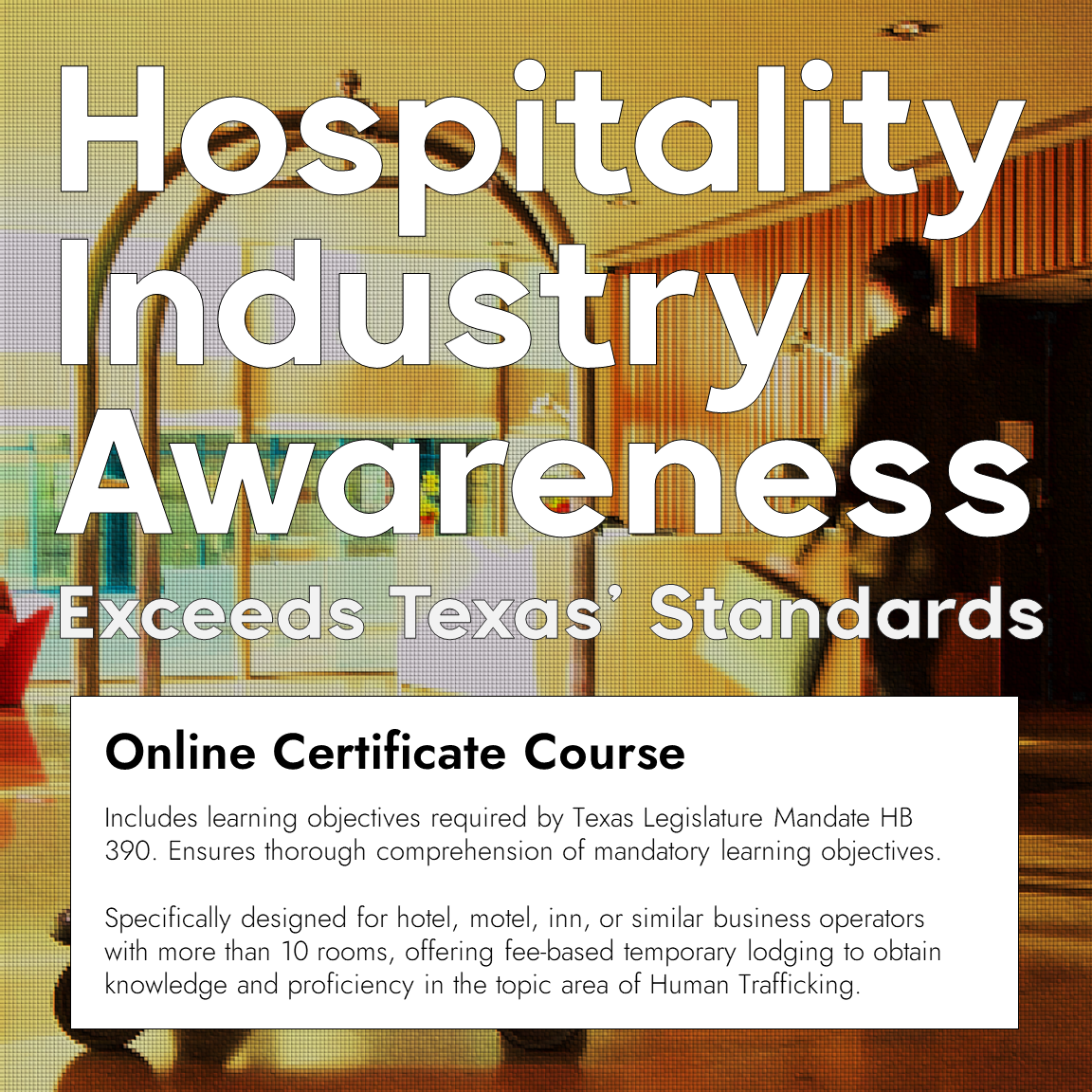Hospitality Industry Awareness: Online Certificate Course
$24.99
Training for the hospitality industry
Specifically designed human trafficking awareness and prevention training for hotel, motel, inn, or similar business operators with more than 10 rooms, offering fee-based temporary lodging.
Hospitality Industry Awareness is a self-contained course that dramatically exceeds learning objective requirements of all states with mandatory training.
.
Please contact [email protected] to learn more
Out of stock
- Satisfaction Guaranteed
- No Hassle Refunds
- Secure Payments
Hospitality Industry Awareness
- Employees receive a certificate upon completion
- Duration: 20+ minutes
Employer recommendations
- Must be completed by a new employee within 90 days after they were hired (similar to Texas’ requirements)
Learning objectives
- An overview of human trafficking;
- How to identify who is most at risk for human trafficking;
- The difference between labor and sex trafficking when identifying human trafficking in the hospitality industry;
- The employee’s role in reporting and responding to human trafficking; and
- Contact information for reporting human trafficking.
Mandatory training requirements are integrated into multiple learning modalities used throughout the interactive course. Learning objectives are woven throughout mixed media, audio, video, graphics, descriptive stories, downloadable resources, written lessons, interactive activities, a Pre-Course Assessment, and practice tests. Students are challenged to take an assessment-based Final Certificate Exam to demonstrate mastery of the material.
Training Design
- The training excludes sensationalized imagery, bias, prejudice, or confidential information.
- The training is designed with human trafficking survivor consultation.
- The training content is evidence-based and free from factual errors. If statistics are used, there should be a citation and references to where these statistics were found and the date the statistic was published.
- The learning objectives are clear, and these objectives are met with the training.
- The training must cover the key components, found below.
- If offering continuing education credit, the training should clearly state the type of continuing education credit that will be awarded and detailed instructions on how to document and apply for the credit.
- The training material is 30 minutes in duration.
Key Components
- Includes an overview of human trafficking:
- The training must define human trafficking.
- The training describes the concepts of force, fraud or coercion within the context of human trafficking.
- All major forms of trafficking (including labor, sex, adult, child) are identified and discussed.
- The training clarifies that trafficking does not require crossing international or state borders.
- The training differentiates between human trafficking and smuggling as well as sex and labor trafficking.
- The training includes a description of the experience of human trafficking victims.
- Contains guidance on how to identify individuals who are most at risk for human trafficking. This should include specific red flag indicators of human trafficking, including:
- Person appears submissive, fearful, tense, or paranoid.
- Person has physical injuries or branding such as a name tattoo.
- Person defers to another person when answering questions.
- Person works but lacks control over their money or identification documents.
- Person is unsure about who they are with and what they are doing.
- Person works excessive hours and lives where they work.
- Person’s clothing is inappropriate for weather conditions or the situation.
- Person has multiple phones or social media accounts.
- Provides information related to the identification of human trafficking in the hospitality industry.
- The training explains how and why human trafficking takes place in the hospitality industry.
- The training discusses commercial lodging’s role in addressing sex trafficking.
- The training identifies different types of hotel contract workers, who are vulnerable to labor trafficking.
- Guides staff on their role in reporting and responding to human trafficking:
- The training provides guidance on the role of an employee in reporting and responding to human trafficking, including how to respond to any victims asking for assistance.
- The training lists the contact information of appropriate entities for reporting human trafficking, including the National Human Trafficking Hotline toll-free telephone number and text line, appropriate local law enforcement agencies, and a telephone number designated by the attorney general for reporting suspected human trafficking. Specifically, the training must direct the audience to call 911 in an emergency, to contact National Human Trafficking Hotline at 888-373-7888 or text 233733 regarding assistance for victims of human trafficking.
- The training includes information on the human trafficking signage required to be displayed in commercial lodging establishments.
- The training includes information regarding the requirement that employees of commercial lodging establishments receive annual human trafficking training, and it must contain the following language: that employees “may not be disciplined, retaliated against, or otherwise discriminated against for making a good faith report of a suspected act of human trafficking.”
Certification & Compliance Recommendations
- The training must be completed by a new employee of the establishment not later than the 90th day after the date the employee is hired.
- All employees must be trained annually.
- The approved training provider must provide a certificate of completion to every employee who completes the training, and the certificate of must include the date the course was taken and the title of the course.
- An operator of a commercial lodging establishment must retain a paper or electronic copy of each annual certificate of completion for every employee who completes the training.

